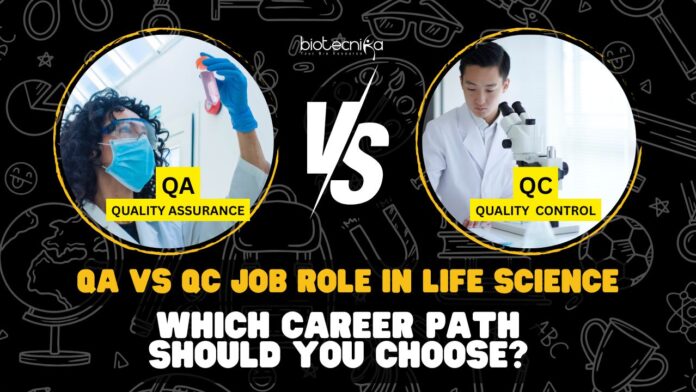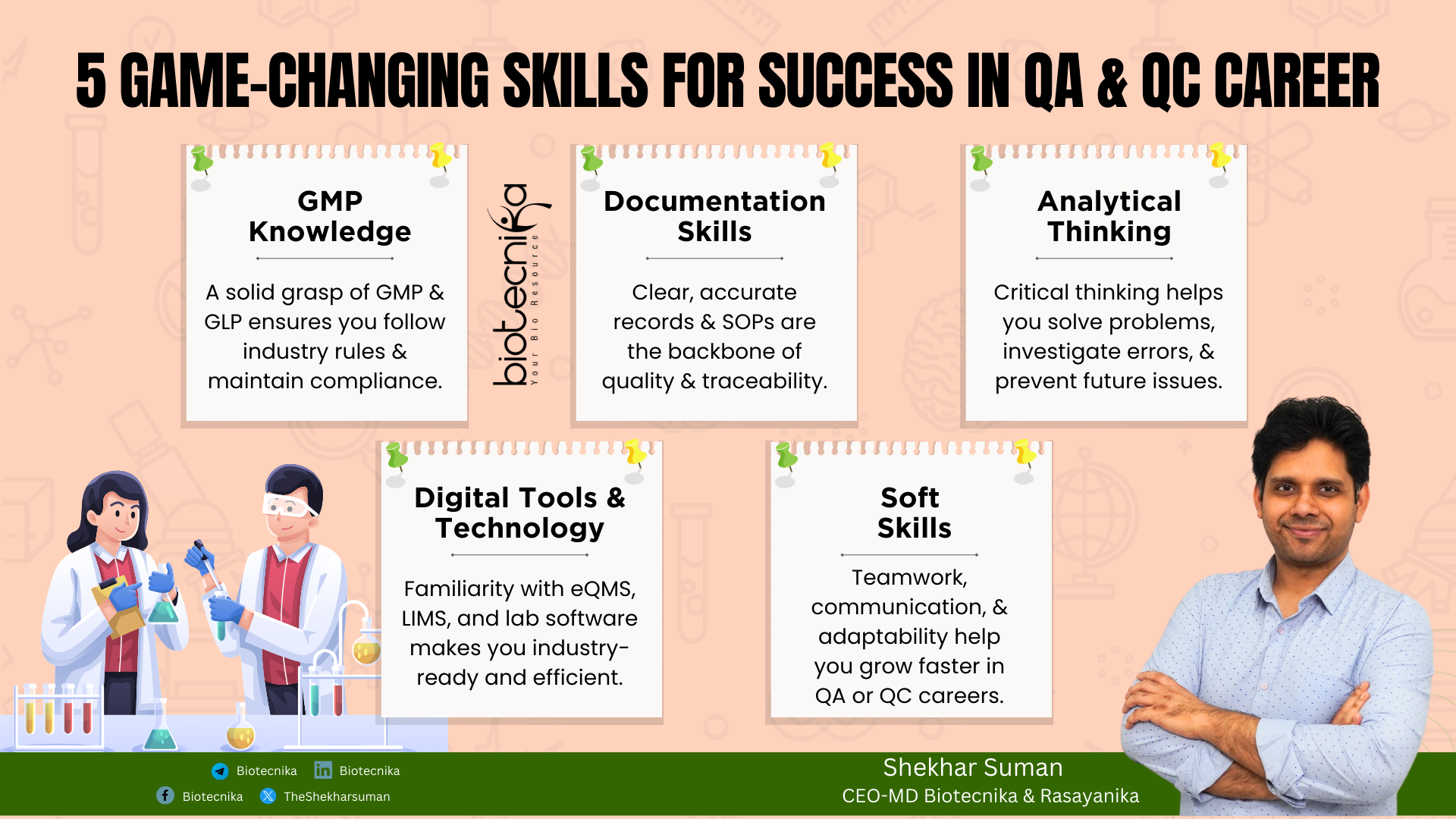Table of Contents
QA vs QC Job in Life Science: Which Track Should You Choose and Why Both Are Essential
When Sukanya finished her Master’s in Microbiology, she stepped into the highly competitive job market with lots of hopes and dreams. She landed an interview at one of the renowned pharmaceutical companies. During the interview, the Hiring Manager asked, “Would you like to work in a QA or a QC role?”
This one question made her freeze. She has heard about QA vs QC in Life Science during her college years. But the difference wasn’t clear. Was QA about testing? Was QC just paperwork? Which one had better career growth?
If you have ever been in Sukanya’s shoes, then let me tell you that you are not alone. Most fresher struggles with this question. But don’t worry. By the end of this article, you will have a better understanding of QA and QC. From their role to skills to need to land a job, we will draw a clear picture for you. We will break down the basics of QA and QC, compare them side by side, look at daily tasks, skills, and career paths, and much more. So, let’s dive in.
The Basics of QA vs QC Job in Life Science
I’m not going to give you a textbook definition of QA and QC. Let’s make it easiest for you to understand and remember the difference between the two forever.
So, QA or Quality Assurance focuses on processes. A QA professional builds systems, writes SOPs, audits suppliers, and ensures compliance with regulations. As a QA professional, you must be proactive in preventing mistakes before they occur.
Then comes QC or Quality Control, focusing on products. As a QC expert, you will have test samples, check results, and ensure each batch meets specifications. QC is reactive. A QC professional finds problems if they occur.
In short, they just say that QA is a rulemaker, whereas QC is the referee who checks if the rules are being followed correctly.
Why QA and QC Job Matter in Life Sciences?
Have you ever thought why we need QA or QC experts in Life Sciences? As you know, the pharmaceutical and biotechnology industries are the most regulated fields. Even a small mistake in a drug or device can put human lives at risk. That’s why we have regulators such as the FDA (Food and Drug Administration), EMA (European Medicines Agency), and global standards like ICH Q10 and ISO. These agencies make sure that companies maintain a strong QA and QC system.
And here come our QA and QC experts into the picture. They are the hidden heroes of these industries. If QC detects an issue, QA steps into investigating the root cause and improving the processes to prevent them from happening again. Without QA, mistakes will reappear, and without QC, the unsafe products could reach patients. And together, they are protecting not only the public health but also the reputation of the companies and their employees.
Now that you have realized the importance of QA and QC in these industries, let’s see what they really do.
What QA Professionals Do?
A QA career in Life Science means you will be working with systems, compliance, and documentation. Their key responsibilities are:
- Writing and approving SOPs and batch records.
- Handling deviations and ensuring proper CAPA (Corrective and Preventive Action).
- Conducting internal audits and preparing for regulatory inspections.
- Managing change control when equipment, materials, or processes change.
- Training employees on GMP (Good Manufacturing Practices) and documentation.
- Reviewing and approving product release decisions.
Industries hiring QA: As a QA expert, you can work in pharmaceutical, biotechnology, medical devices, food safety, and cosmetics manufacturing.
What QC Professionals Do?
As a QC expert, your work will be more hands-on and lab-focused. You will spend time with instrumentation, testing, and raw data. Their duty includes:
- Testing raw materials before they enter the production process.
- Performing in-process checks during manufacturing.
- Running tests on finished products using techniques like HPLC, GC, microbiological assays, or stability studies.
- Recording and analyzing data for trends.
- Ensuring instruments are calibrated and methods validated.
Industries hiring QC: You can find opportunities in pharma, food testing labs, contract research organizations (CROs), biotech, and environmental testing labs.
QA/QC Industry-Ready Training Program Registrations Open at Biotecnika
✔️GET HANDS-ON TRAINING + PROJECT WORK + PLACEMENT ASSISTANCE
STARTS 12th SEP 2025
Whatsapp an Expert for more details
Essential Skills for QA and QC Professionals
Now that you have a clear picture of their job responsibilities. Let’s make a list of skills that you must have as a fresh Life Science graduate to stand out from the rest.
- GMP Knowledge: Irrespective of the job role, you must have a clear understanding of good manufacturing and laboratory practices.
- Documentation Skills: You should be able to write clear reports, logs, and SOPs.
- Analytical Thinking: whether you work in labs or audit systems, you should be able to tackle the issues.
- Digital Tools: As a QA or QC, you must be familiar with tools such as eQMS (electronic Quality Management Systems), LIMS, or lab software.
- Soft Skills: The skills like Teamwork, communication, and adaptability will help you climb the success ladder sooner.
Salary Trends in QA vs QC in Life Science
Now let’s have some money talks. When choosing a career, salary is often one of the first questions freshers ask about. While both these fields offer steady career growth in life sciences, their starting pay and long-term potential can differ. It depends on industry, skills, and also the region. Take a closer look at how salaries compare in QA vs QC.
For fresh graduates in India:
- On average, QA salaries range from ₹2.5 – 4.5 LPA. Some roles, like QA Associates, often start with slightly higher than QC due to the regulatory responsibilities.
- Whereas, the average QC salary ranges from ₹2.2 – 4.2 LPA. An experienced QC analyst with expertise in advanced techniques or regulatory testing can earn more than a QA professional.
Globally, salaries are higher:
- In the US, entry-level QA/QC Roles start at $50,000–65,000 per year. With experience, professionals can earn $ 100,000 or more.
Growth Opportunities in QA vs QC Job in Life Science
Both QA and QC roles are in high demand because no life science company can operate without them. As you grow:
- In QA, you can transition into regulatory affairs, compliance management, or become a Qualified Person (QP) in regions such as Europe.
- In QC, you can progress to senior scientist roles, specialize in analytical development, or move into leadership as a QC Manager/Director.
With experience in both, you can aim for top leadership roles such as Head of Quality or VP of Quality Operations.
Future Outlook: Why QA and QC Careers Are Growing?
- Pharma & Biotech Boom: With increasing drug development, biologics, and vaccines, QA/QC roles are expanding worldwide.
- Food Industry: Food safety regulations require both QA (food safety programs) and QC (contaminant testing).
- Medical Devices & Diagnostics: QA ensures regulatory approval, while QC ensures the accuracy of test kits and devices.
- Digital Tools: eQMS and automated lab testing are creating new opportunities for graduates with both life science and tech skills.
How to Decide Which Track Is Best for You?
Many students often wonder, “Which is best – QA or QC?” Here’s a simple way to decide:
- Pick QA if you enjoy processes, paperwork, system design, and problem-solving at a big-picture level. You’re good at communication, audits, and ensuring people follow rules.
- Pick QC if you love lab work, instruments, testing, and analyzing data. You want to stay close to science and directly check product quality.
Both tracks are valuable, and many professionals start in QC and later transition into QA roles as they gain experience.
QA vs QC in Life Science: A Comparison Table
| Aspect | Quality Assurance (QA) | Quality Control (QC) |
| Focus | Process-oriented: builds systems to prevent mistakes | Product-oriented: tests and inspects outcomes |
| Approach | Proactive – avoids issues before they occur | Reactive – finds problems after production |
| Work Setting | More documentation, audits, and compliance activities | More lab-based, testing, and hands-on analysis |
| Common Roles | QA Associate, QA Specialist, Validation Engineer | QC Analyst, QC Chemist, QC Microbiologist |
| Examples in the Food Industry | Checking suppliers, approving food safety SOPs | Testing food samples for pathogens or allergens |
| Examples in Manufacturing | Reviewing batch records, handling deviations | Inspecting equipment output, checking packaging |
| Examples in the Laboratory | Approving lab procedures, training lab staff | Performing HPLC, GC, microbial or stability tests |
| Salary Range (India, freshers) | ₹2.5 – 4.5 LPA; senior QA roles up to ₹15–20 LPA | ₹2.2 – 4.2 LPA; senior QC roles up to ₹12–18 LPA |
| Best Fit For | Students who enjoy documentation, audits, and compliance | Students who enjoy lab work, testing, and data |
Conclusion
In the QA vs QC Job in Life Science debate, there’s no real competition. It’s only a collaboration. QA prevents problems, QC detects them. QA focuses on processes, QC focuses on products.
As a student or fresh graduate, the choice depends on your strengths:
- Love systems, rules, and compliance? Go QA.
- Love labs, testing, and instruments? Go QC.
Whichever path you choose, remember this: QA and QC professionals are guardians of trust in the life sciences. Without them, no medicine, vaccine, or medical device could safely reach a patient. And that makes both careers not just rewarding, but essential.
Just think of Sukanya, when she first heard that interview question, she froze. But if she had known the difference between QA and QC, she would have answered with confidence, showing where her true strengths lay. Now, you won’t be in her shoes. You have the clarity to choose wisely and step into the life science industry with confidence.































